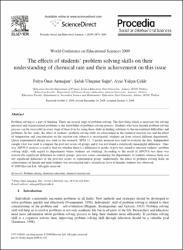The effects of students' problem solving skills on their understanding of chemical rate and their achievement on this issue

View/
xmlui.dri2xhtml.METS-1.0.item-rights
info:eu-repo/semantics/openAccessDate
2009Metadata
Show full item recordAbstract
Problem solving is a part of thinking. There are several steps of problem solving. The first thing which is necessary for solving personal and organizational problems is the knowledge of problem solving process. Students who have learned problem solving process can be successful in every stage of their lives by using these skills in finding solutions to the encountered difficulties and problems. In this study, the effect of students' problem solving skills on achievement in the chemical reaction rate and the effect of temperature and concentration on the reaction rate subjects is investigated; students are from several different departments. Quasy experimental design was used in this research. SPSS 11, 5 packet program was used to evaluate the data. Independent sample t-test was used to compare the post test scores of groups and it was not found a statistically meaningful difference. One-way ANOVA analysis is used to find out whether there is a difference in results of post-test, aimed to measure students' problem solving skills, with regard to departments where students are studying. According to the result of ANOVA test there was statistically significant difference in control groups' post-test scores considering the departments of students whereas there was not significant difference in the post-test scores of experimental group. Additionally, the effect of problem solving skills on achievements of female and male students was investigated and a situation in favor of females students was observed. (C) 2009 Elsevier Ltd. All rights reserved

















